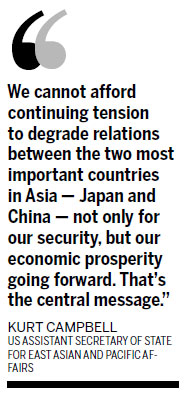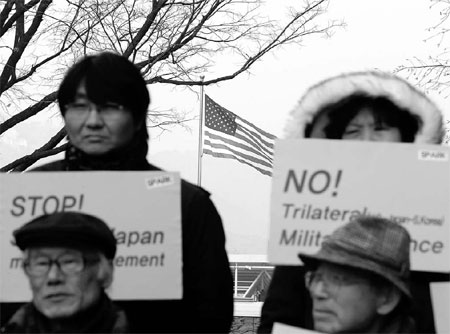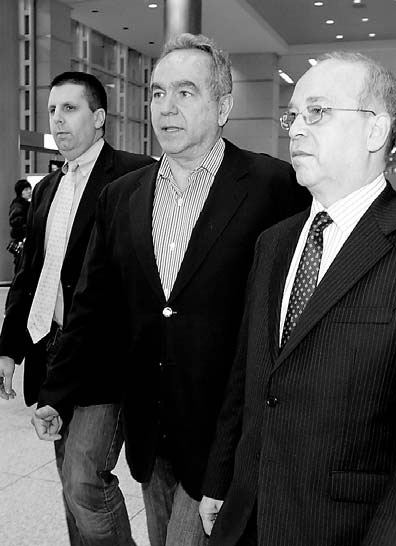US delegation looks to mend fences
Updated: 2013-01-16 08:08
By Cheng Guangjin (China Daily)
|
||||||||
|
A US flag flies at the US embassy as protesters hold a rally denouncing a military alliance between the Republic of Korea, the United States and Japan, and demanding to restart the Six Party Talks ahead of a visit by US officials in Seoul, on Tuesday. Lee Jin-man / Associated Press |
|
US Assistant Secretary of State Kurt Campbell (center), Assistant Secretary of Defense Mark Lippert (left) and the National Security Council Senior Director for Asian Affairs Daniel Russel arrive at Incheon airport in Incheon, west of Seoul, on Tuesday. Lee Jae-Won / Reuters |

A high-level US delegation led by its top diplomat for East Asia, Kurt Campbell, arrived in Seoul on Tuesday and will visit Japan later this week amid simmering tensions in the region.
Accompanying Campbell is US Assistant Secretary of Defense Mark Lipper and National Security Council Senior Director for Asian Affairs Daniel Russell, Reuters reported, noting that the trip to two Asian allies is "anything but routine".
One of the aims of the mission will be mending the alliance that has been damaged by disputes between the two countries, said Shi Yinhong, an expert on US studies at the Beijing-based Renmin University of China.
Japan is likely to be encouraged by the US delegation to maintain its tough stance on disputes with China over the Diaoyu Islands, which will worsen the current situation, Shi said.
The US has said the islets are covered under the US-Japan security treaty. It has also claimed it takes no position on the sovereignty dispute.
The visit comes shortly after the election of a new Japanese government in December, and before the new president of the Republic of Korea is inaugurated next month.
Territorial disputes between Japan and the ROK intensified in August when ROK President Lee Myung-bak became the first ROK leader to set foot on an island claimed by both countries.
A standoff between Japan and China over the Diaoyu Islands and Pyongyang's threats to develop nuclear weapons have also endangered peace and stability in the region.
"We want to see the new Japanese government, the new South Korean government, all of the countries in Northeast Asia working together and solving any outstanding issues, whether they are territorial, whether they are historic, through dialogue," US State Department spokeswoman Victoria Nuland said last week.
In a talk on Asia last week at the Washington-based Carnegie Endowment for International Peace, Campbell said the United States wants both China and Japan to "recognize that Northeast Asia is too important to the global economy".
"We cannot afford continuing tension to degrade relations between the two most important countries in Asia - Japan and China - not only for our security, but our economic prosperity going forward. That's the central message," Campbell said.
US Secretary of State Hillary Clinton met visiting Chinese Vice-Minister of Foreign Affairs Cui Tiankai in a closed-door meeting at the State Department last Thursday.
According to Reuters, another understated aim of the Campbell mission to Tokyo is to convince Japanese Prime Minister Shinzo Abe to step away from nationalist policies, which will anger Asian nations that suffered from Japan's militarism and further complicate US attempts to manage ties between its allies in the region and relations with China.
Abe has called for revising or rescinding a landmark 1995 apology for Japan's wartime aggression and a 1993 statement that acknowledges an official Japanese role in recruiting "comfort women", or sex slaves, to serve its troops during World War II.
Pu Zhendong and Reuters contributed to this story.
chengguangjin@chinadaily.com.cn
(China Daily 01/16/2013 page11)

 In Photos: 7.0-magnitude quake hits Sichuan
In Photos: 7.0-magnitude quake hits Sichuan
 Li Na on Time cover, makes influential 100 list
Li Na on Time cover, makes influential 100 list
 FBI releases photos of 2 Boston bombings suspects
FBI releases photos of 2 Boston bombings suspects
 World's wackiest hairstyles
World's wackiest hairstyles
 Sandstorms strike Northwest China
Sandstorms strike Northwest China
 Never-seen photos of Madonna on display
Never-seen photos of Madonna on display
 H7N9 outbreak linked to waterfowl migration
H7N9 outbreak linked to waterfowl migration
 Dozens feared dead in Texas plant blast
Dozens feared dead in Texas plant blast
Most Viewed
Editor's Picks

|

|

|

|

|

|
Today's Top News
Live report: 7.0-magnitude quake hits Sichuan, heavy casualties feared
Boston suspect cornered on boat
Cross-talk artist helps to spread the word
'Green' awareness levels drop in Beijing
Palace Museum spruces up
First couple on Time's list of most influential
H7N9 flu transmission studied
Trading channels 'need to broaden'
US Weekly

|

|









